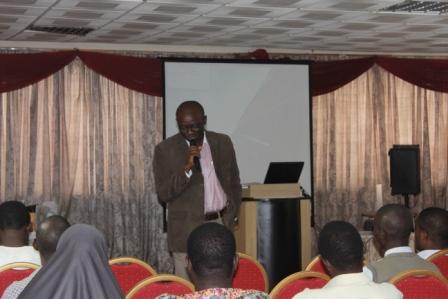
By Todd Hirsch
Dear Applicant: Thank you for your letter inquiring about positions in our economics department. At this time, we have no openings. However, I will keep your letter on file should an appropriate job become available.
At least, that’s what I am required to tell you. But here’s what I’d really like to say to you – and to every recent economics graduate who sends me the same letter.
First, I know it’s lousy for bachelor of arts grads looking for a job “in their field.” Twenty years ago, it was lousy for me too. It’s almost always lousy. In a way, it’s kind of supposed to be – a small rite of passage to welcome you into the working world. It’s sort of like being froshed.
But if I may, I would like to offer some advice.
Don’t be too fixated on landing a job “in your field.” The truth is, you don’t yet have a field. In university, you majored in economics, but that may or may not be your eventual field of professional work. The world is full of possibilities; limiting your search to an economist job is a terribly narrow way to start out.
You chose to study economics, which doesn’t necessarily imply that you’ll be an economist. Rather, it implies you have an aptitude for problem solving. You’re probably good at analyzing data. You can see different sides of an argument. And I’ll bet you’re excellent at finding solutions to problems. These are essential skills required in hundreds of rewarding (and lucrative) fields of professional employment.
Your ultimate field may actually be in sales for a biotech firm. It may be analyzing crime statistics for the city police. It may even be a rock star (just ask Mick Jagger). The world is full of “fields.”
What you’re facing is a common problem: BA graduates confuse their major area of study with what they expect to be their eventual careers. It doesn’t matter if it’s a degree in history, film studies, sociology, or comparative feminist literature.
You’ve successfully navigated your way through a four-year degree. Congratulations! That is no small accomplishment. But now you’re embarking on a totally different program of learning – one that will last the rest of your life. It’s called “What am I here for?”
That may sound all spiritual and existential, but don’t let it throw you off. It just means that your challenge from here on is to find what you’re good at, and keep getting better and better at it.
An apology, by the way, on behalf of society. We are sorry if we led you to believe that attending university would land you a good job. That’s not actually true. A polytechnic college will do this – and the job opportunities available right now are fantastic. A good option for you might be to continue post-university studies at a polytechnic.
But your university education, at least at the bachelor of arts level, was never intended to land you a job. It was intended to make you a more complete thinker. It was intended to teach you how to absorb complex information and make reasoned arguments. It was, quite simply, intended to teach you how to learn. Those are skills that you’ll use in any field of work.
Open your mind to all sorts of job possibilities. Don’t be too proud to start out in the service industry, or where you might get your fingernails dirty. Talk to as many people as you can about their career paths. Go live overseas for a year or two. But never, ever, allow yourself to think you’ve wasted your time in university if you don’t land a job as an economist.
Meanwhile, be encouraged and stay positive. And yes, I will keep your letter on file. But my guess is that when a position in my economics group eventually opens up, you’ll no longer be available.
Todd Hirsch is the Calgary-based chief economist of ATB Financial and author of The Boiling Frog Dilemma: Saving Canada from Economic Decline.
*****
One of the ardent readers of this blog, Abusgar, actually forwarded this essay to me to consider the possibility of publishing here. Before reading, I concluded to publish with the caveat that I don’t necessarily share same opinion with the writer. This is because I find myself almost always disagreeing with many western theorists and even motivational speakers. In fact, there are very few people I agree with on career and motivation subjects (readers here would have seen me begging to differ slightly from Ajanlekoko and Obafemi a couple of times). But alas, I finished the article not only sharing exactly same view, but also having similar story. I am also a firm believer in the fact, the ‘field’ you studied in the university may not be the field you will eventually end up.
I studied economics (co-incidentally the example Todd also used) and even had a first class in it, but today I earn a living as an accountant! No denying the fact that the first class on my CV has helped me (at least made employers want to talk to me), in actual fact it is the ICAN I wrote that got me jobs. I am also a writer, which is another field I can conveniently earn a livelihood, but that is not derived from my economics ‘field’ again. TY Bello, like Simon Kolawole mentioned at the 1st Jarushub Conference, studied economics but today earns a living from photography. THe GCFO of the biggest indigenous oil and gas group in Nigeria studied mechanical engineering, but he is today a Finance expert. I can go on and on.
I agree with Todd in the above article. Don’t restrict yourself to your field of university study only.
Jarus
Established in March 2013, JarusHub is a Nigerian information hub with focus on career and management. It is rated Nigeria's most authoritative destination for online career resources. It parades an array of Nigerian professionals who share their career experiences with a view to bridging career information gap and mentoring a generation to success. Whether you're a student, a recent graduate or an established professional, or even an executive, you will always find something to learn on JarusHub. All enquiries to jarushub@gmail.com or 0808 540 4500. Facebook: www.facebook.com/jarushub; Twitter: @jarushub or @mcjarus.
Career Q&A with Jarus: Oil & gas career, poor CGPA
September 17, 2023What is Career Counselling? How to choose the Right Career?
October 24, 2022Career Advice: Play to Your Strength
March 6, 2022
1 comment
Let us have your say by leaving a comment belowCancel reply
Recommended For You
-
Sales Professionalism: From Good to Great
January 20, 2014 -
Quitting a job without a job: What you Should be conscious of
January 24, 2014









Thanks for this wonderful platform,it has added value to me…..